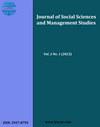Final and Binding Essence on Constitutional Court’s Judgment in Judicial Review
引用次数: 0
Abstract
Mahkamah Konstitusi, has specific characters, one of the typical characters is the final and binding judgement. The reality is many judgements of the constitutional court are not complied with and tend to be ignored by the legislature. Then the petitioner who feel that their constitutional rights have been violated do not have instruments to fight for their constitutional rights that have been violated by the legislators. Based on the statement above, there are problems which is studied, what underlying the basic consideration of the formation of Constitutional Court in Indonesia? And what is the essence of the final and binding of Constitutional Court’s judgements? The aim of this study is to determine and comprehend the essence contained in final and binding nature of the Constitutional Court’s judgements, especially in judicial review of UUD 1945. The method of law study used was normative law research method which is law research from internal perspective with the object of the study was law norms. It can be concluded that the basic rationale of MK formation in Indonesia, from political side, the existence of MK is required to balancing the legislators’ power. From the law side, the existance of MK is the consequence from the change of MPR supremacy become constitution supremacy. The essence of final and binding Constitutional Court’s judgement is the stand- alone judgments, so that the judgement cannot be taken by legal action. Constitutional Court judgement is erga omnes which means binding on other parties, including state administrator.论宪法法院司法审查判决的终局性和约束性
《宪法》具有特定的特征,其中一个典型特征就是最终的约束性判决。现实情况是,宪法法院的许多判决没有得到遵守,而且往往被立法机关忽视。因此,认为自己的宪法权利受到侵犯的请愿人没有工具来争取他们被立法者侵犯的宪法权利。基于以上的陈述,有一些问题需要研究,在印度尼西亚组建宪法法院的基本考虑是什么?宪法法院判决的终局性和约束力的本质是什么?本研究的目的是确定和理解宪法法院判决的最终和约束性所包含的本质,特别是在1945年宪法法院的司法审查中。法律研究的方法是规范法研究方法,即从内在视角进行法律研究,研究对象是法律规范。可以得出结论,印尼MK形成的基本原理,从政治角度来看,MK的存在是为了平衡立法者的权力。从法律的角度看,MK的存在是MPR至上向宪法至上转变的结果。宪法法院具有约束力的终局判决的本质是独立判决,不能通过法律诉讼进行判决。宪法法院的判决是普遍适用的,这意味着对包括国家行政人员在内的其他当事方具有约束力。
本文章由计算机程序翻译,如有差异,请以英文原文为准。
求助全文
约1分钟内获得全文
求助全文
来源期刊

Journal of Social Sciences and Management Studies
Social Sciences and Management Studies-
自引率
0.00%
发文量
0
期刊介绍:
Journal of Social Sciences and Management Studies (ISSN: 2957-8795) is a peer reviewed journal focuses on integrating theory, research and practice in the area of management and social sciences. The journal discusses the distinctive disciplinary practices within the sciences of the management and social field and examines examples of these practices. In order to define and exemplify disciplinarity, the journal fosters dialogue ranging from the broad and speculative to the microcosmic and empirical. In considering the varied interdisciplinary, trans-disciplinary or multidisciplinary work across and between the social, natural and applied sciences, the journal showcases interdisciplinary practices in action. The focus of papers ranges from the finely grained and empirical, to wide-ranging multi-disciplinary and transdisciplinary practices, to perspectives on knowledge and method.
 求助内容:
求助内容: 应助结果提醒方式:
应助结果提醒方式:


